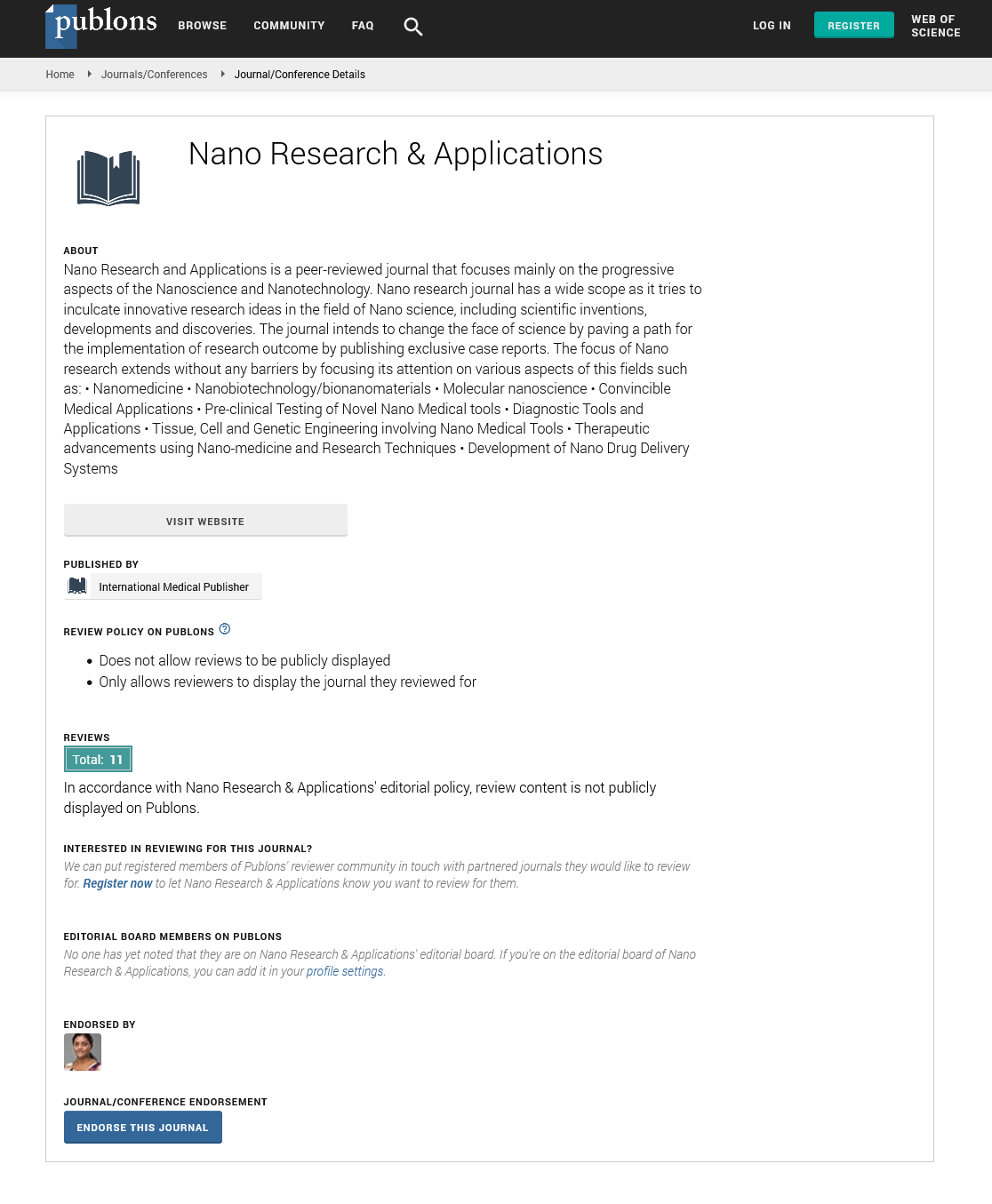ISSN : 2471-9838
Nano Research & Applications
Dedoped polyaniline/ammonium cobalt phosphate (ACP) hybrid supercapacitor
18th Edition of International Conference on Emerging Trends in Materials Science and Nanotechnology
January 28-29, 2019 Barcelona, Spain
Temitope E Bakare and Werner E van Zyl
University of Kwazulu-Natal, South Africa
Posters & Accepted Abstracts: Nano Res Appl
DOI: 10.21767/2471-9838-C1-031
Abstract
Supercapacitor devices are of keen interest because of their high energy density and quick charging and discharging potential among other energy storage systems. Of the materials used in this storage system, polyaniline is known for its monotical charge delivery over discharging potential window. In this work, dedoped polyaniline (dPANI) was modified with 30%, 32%, 34% and 40% ammonium cobalt phosphate (ACP) denoted as dPANI-ACP for improved capacitance performance in 1 M KOH. Results from FTIR studies shows that there is bond between nitrogen of dPANI and cobalt in ACP as confirmed by reduction in intensity of vibration frequency of C–N bond of dPANI-ACP compared to unmodified PANI as well as shift in vibration band of O–P–Ostr to high frequency which is seen as an overlap and a doublet at 806–810 cm-1 on the composites. SEM images, HR-TEM and SAED images show the dPANI as an amorphous strand with good porosity, the ACP as stacked flat crystalline sheets and the dPANI-ACPs as ACP embedded in the PANI strands. This is corroborated by the SAED images in which a regular electron pattern from the ACP crystal is embedded on the characteristic amorphous ring of the dPANI. Specific capacitance (C¬sp) (Fig 1) of the dPANI and dPANIACPs from cyclic voltammetry indicated the value of 0.24 Fg-1 for dPANI and 3.61, 0.58, 9.13, 3.67 Fg-1 for 30%, 32%, 36%, 40% dPANI-ACP respectively at 10 mV/s scan rate. Impedance studies corroborated the C¬sp values as the highest phase angle value of 73.6ᶿ (90ᶿ for ideal capacitor) was obtained for the 32% dPANI-ACP. In conclusion, a modified form of dPANI with good capacitance and ion exchange potential in 1 M KOH has been produced. Further studies like cycling stability and charging-discharging profile of the material is on-going.
Biography
Temitope E Bakare is a Lecturer at Caleb University, Lagos. He holds a Master’s degree in Inorganic Chemistry from University of Ibadan, Nigeria. He is a winner of Caleb University capacity development fund and a member of research team awarded a grant by Lagos State Research and Development Council (LRDC) on Environmental Quality Improvements Incident upon Lagos State Urbanization Programme - Projecting outcome of Urbanization Regeneration. He has co-authored three papers. He is currently a PhD student at the University of Kwazulu-Natal, South Africa under the supervision of Professor Werner E van Zyl, Chair of the Sustainable Water, Energy and Biomass (SUSWEB) group at the School of Chemistry and Physics, University of Kwazulu-Natal, South Africa.
E-mail: baktemitope@gmail.com
Google Scholar citation report
Citations : 387
Nano Research & Applications received 387 citations as per Google Scholar report
Nano Research & Applications peer review process verified at publons
Abstracted/Indexed in
- Google Scholar
- China National Knowledge Infrastructure (CNKI)
- Directory of Research Journal Indexing (DRJI)
- WorldCat
- Publons
- Secret Search Engine Labs
- Euro Pub
Open Access Journals
- Aquaculture & Veterinary Science
- Chemistry & Chemical Sciences
- Clinical Sciences
- Engineering
- General Science
- Genetics & Molecular Biology
- Health Care & Nursing
- Immunology & Microbiology
- Materials Science
- Mathematics & Physics
- Medical Sciences
- Neurology & Psychiatry
- Oncology & Cancer Science
- Pharmaceutical Sciences
